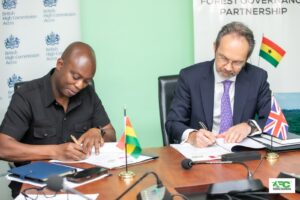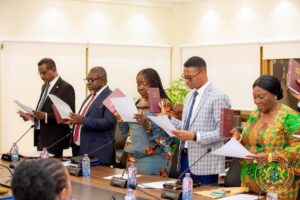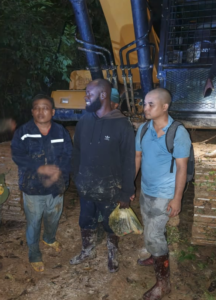
Cardinal Peter Kodwo Appiah Turkson
Ghana’s top cleric, Cardinal Peter Kodwo Appiah Turkson, has issued a damning critique of the nation’s institutions, warning they risk becoming a “travesty of democracy.” The Cardinal, who serves as the Chancellor of the Pontifical Academies of Sciences and Social Sciences at the Vatican, made his shocking remarks during the 2024 IDEG Ghana Speaks High-Level Forum in Accra.
Speaking before a distinguished audience, Cardinal Turkson didn’t mince his words as he took aim at the country’s faltering governance systems. Under the theme “Advancing Peace, Unity, and National Cohesion in Ghana,” the forum quickly turned into a reality check for the powers that be.
“Institutions must serve the people, not the other way around,” the Cardinal declared, striking at the very heart of Ghana’s democratic apparatus. His comments have left many wondering just how deep the rot in the nation’s democracy goes. “Every social institution must serve the human person. Democracy as a system of governance must serve the human person and not reduce the human person to servitude,” he added, suggesting that some institutions may have lost their way.
In his most scathing rebuke yet, the Cardinal called for urgent reform, insisting that any governance system that enslaves the people rather than empowering them has failed. “If any human institutions reduce us into servitude, it’s time for a change,” he warned, his words echoing throughout the packed hall.
The Cardinal’s bold statements come at a critical time when questions are being asked about Ghana’s democratic health, particularly as the country gears up for the 2024 general elections. Allegations of corruption, weak institutions, and political infighting have plagued the nation’s progress, casting a dark cloud over its democratic credentials.
Cardinal Turkson’s stark message cuts straight to the core of Ghana’s current challenges. He reminded the country’s leaders that democracy is supposed to uplift its citizens, not trap them in a cycle of poverty and disenfranchisement. “Democracy or the form of governance is meant to serve us, promote our well-being, and our common good,” he insisted.
With the national conversation increasingly dominated by complaints of institutional failure—from the judiciary to parliament—Cardinal Turkson’s intervention is bound to stir the political pot. His remarks will likely send shockwaves through government circles, with many left to ponder whether Ghana’s democratic institutions are truly serving the people or merely serving themselves.
As Ghana’s political class digests this stunning critique, many are left wondering if Cardinal Turkson’s words will be the wake-up call needed to prevent the country from descending into further dysfunction. One thing is clear: the chasm between Ghana’s institutions and its citizens is growing, and without urgent reform, the democracy the nation fought so hard to build may soon crumble.
For now, all eyes are on the government to see if they will heed the Cardinal’s call or continue down the same perilous path.






